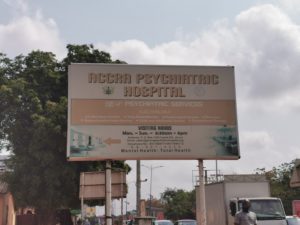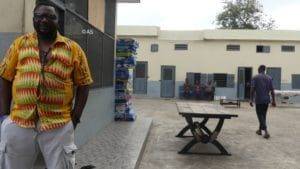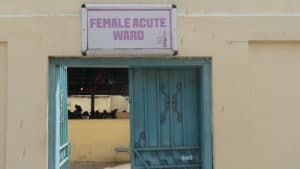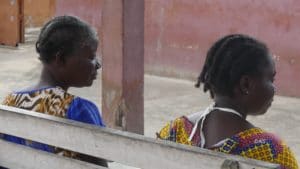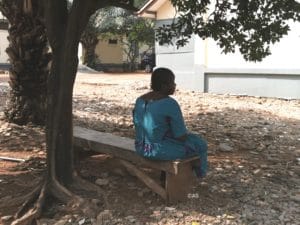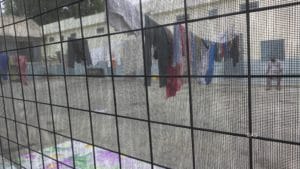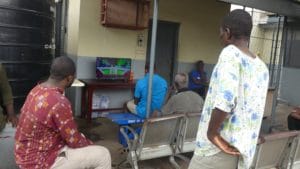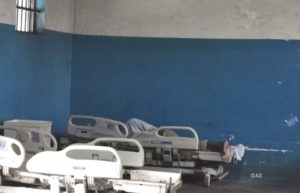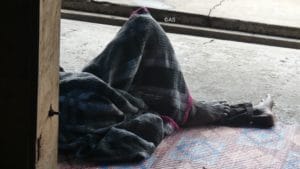Ghana, the solitude of the mentally ill in wards that were prisons
(Accra) – She sits on the ground with his legs straight and crossed. She is naked. She doesn’t look at me. She is intent on looking at her naked body. I wonder why. Who knows what she thinks and if it makes sense. “A good Samaritan” brought her here, they tell me. No one knows who she is, not even her name, and she is of indefinable age. She refuses to get dressed, this is the only noticeable thing. Along with the loneliness that surrounds her.
This woman, lost in who knows what, is one of the guests of one of the women’s sections of the psychiatric hospital in Accra. The area in which it is located takes the name of Asylum Down, the ancient way of calling it. A building that dates back to 1906 (when Ghana was still a British protectorate) and where here and there, the structure of a prison is recognized. From its birth until the 1960s, people here were not treated, whatever the reason for disorder or criminal behavior the destination was prison. Alienating these people from society was the means to get rid of them and to restore order. Today, in this Institute (two more have been built in the country in the meantime), there are 19 departments. These are courtyards for the most part on the sides of which there are rooms, often dark and impassable.
Accra Psychiatric Hospital – Gallery by Antonella Sinopoli ©. Click to enter.
Samuel is a big and tall man. He wears clothes at least twice smaller than his size. That’s why he keeps the zipper of his pants open and his shirt, with typical wax colors, is closed with just two buttons. Unlike the others, who observe me from afar, he immediately approaches me, tells me his full name, his age, asks me my name and begins to tell me his story. A story of violence and marginalization, he also tells me about his 4 children, whom he hasn’t seen for a long time and asks me to get him out. He doesn’t know who I am and that I have no power.
He is in the “special department“, the one intended for those who have committed crimes and that the court has decided to send here. They are people who are deemed unsound and therefore, in addition to expiating their sentence, they require medical treatment. At the moment there are 89 of them, 88 men and an isolated woman.
Even a young boy who continues to shout “I am ignorant, I am ignorant” takes courage, but he smiles – with a beautiful open smile – and opens his arms. With his body he forms a cross. It is his surrender, who knows, in the face of something he does not tell me and that perhaps he cannot explain himself.
In the women’s department there is more frenzy as soon as the gates open. My presence is an unusual one, which breaks the monotony of days that resemble each other. One after the other. I can’t stop the girl who not only hugs me, but squeezes me, not aggressively, but with a desire to hug. And she doesn’t just do it with me, but also with the head nurse and an administrative manager who were accompanying me.
And then there is a very young girl, not older than 25 years, who continues to gently caress my arm, while the other – who does not move away for a moment – crosses her hand in mine – to observe, of course, our different shades of skin. The girl who caresses me has a mental retardation, her mother brought her here and occasionally comes to visit her. Sometimes.
Among the 323 current guests of the Institute, most are people who have asked for help on their own initiative, others are the so-called “vagrants“, people who wander the streets and whom someone reports to social services or bring on their own initiative in the hospital, many others have been forgotten and their families can no longer be traced.
This is the case of the oldest man, 83 years old. He came here with a diagnosis of schizophrenia 40 years ago. At that time there were no cell phones, his relatives didn’t show up anymore and any attempt to track them down did not bear fruit. “He is part of this place” they tell me “this is his family”. But his, like that of many, is a life of solitude. He is now blind, it appears to be because of cataracts, and he sits quietly as if nothing exists.
In the large dormitory a man is dozing on the iron bed and without a mattress “he keeps saying that there are snakes in mattresses“, the head of the department tells me. The place is not dirty, but the toilets are two concrete holes. “Here we need many things – they tell me – we count on donations and good-hearted people”. And the State, the Ministry of Health? “The funds arriving here are not enough” is the answer. And the impression is that there are more administrative, medical and paramedical staff than patients – or prisoners, as those sent here by the judges are defined.
According to the Ghana Center for Democratic Development, the coefficient of access to healthcare in the country is 39.3%. This means – again according to the research agency – that 69.7% of citizens do not have adequate access to medical care. Yet it cannot be said that in the psychiatric sector things have not improved over the years, both from the point of view of services and the quality of treatments.
Today in Ghana there are 40 psychiatrists and 150 psychologists for 31 million inhabitants, they are still insufficient but it is a positive average compared to other countries. Furthermore, the decentralised system has solved the problem of overcrowding (with all the resulting issues), constraint systems are only used in cases of extreme aggression (and in special departments) but electroshock is still practiced. “It is not the first treatment that we take into consideration – explains the head of the department – but it goes hand in hand with other therapies and in case these do not give rapid results“. Among the cases of people subjected to electroshock there are also those of mothers in post-partum crisis who refused to breastfeed their child. “In 90% of cases, just a shock is enough and people return to a state of ‘normality’, for another 5% no results are obtained and a remaining 5% begins to show symptoms that they did not have before the treatment” says the manager who claims to speak on the basis of data based on observation of 9 years of service in the ward.
In any case, understanding the sector of mental illness and it’s treatment is not possible without considering the environment and the reference society.
We talked about it with Dr. Akwasi Osei, executive director of Mental Health Authority, with over 40 years of experience and numerous research and essays in the field of psychiatry. Long is his battle for a new law on mental health and for the de-criminalization of suicidal behaviors (a rule still existing in the Ghanaian penal code).
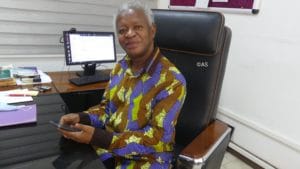
When I go to see him, he shows me dozens and dozens of messages he keeps in Whatsapp, in a folder with the name “suicidal“. His number is on the Internet, the phone is always on, even at night, because there are many people who ask for help “and often they simply need comfort“. Many of them are young people and women and the reasons range from the crisis following sexual violence or bullying, but also economic problems. A toll-free number is being worked on, but – says the director – it is not easy to convince the Ministry to pay for it.
Let’s start with the electroshock treatment. Is it still widely used in hospitals in Ghana?
It is a therapy among others and is obviously used only in certain cases. Therapies always vary from patient to patient and depend not only on the severity of the problem but also on the background of the person we are dealing with, which is why the counseling phase is so important. For some, the listening phase may be enough, for others the use of medicines is needed, for others we have to resort to electroshock. Is it abuse? It is not so. For example, if you do not have malaria and I give you an injection it is abuse because there is no reason to give you the injection, but if you have it and you need specific and strong treatments I am not commiting abuse, I’m treating you. So if the electroshock treatment is practiced within the boundaries of the right intervention, it may be fine for certain patients. Obviously, a correct diagnosis is needed. Those who speak of abuse do not understand the correct use of this system.
What do you think, however, of the abuse of medicines to keep patients calm?
In the past, too many drugs were used to calm patients, it is true, and when patients were aggressive the only method was to tie them. But that is the past and it used to happen even in Europe where in many cases psychiatric institutions were closed even if it was later realized that this created other problems.
In Ghana, as in the whole African continent, the data speak of an increase in cases of mental disorders, how do you explain this?
Cases of people in need of psychiatric care have increased also because the population has increased. At the time of independence, Ghana had a population of 5 million and now we are 31 million, so part of the increase in cases is simply due to the increase in population. But there are other reasons too: the stress of an evolving and moving society, life changes that generate anxiety.
Furthermore, today there is more awareness regarding the issue of mental health. In the past, when you had a problem you went to the spiritualist, but now people go to specialized structures. I must also add, and you may not agree, that cannabis use and alcohol abuse can cause mental disorders. I can confirm that cases of schizophrenia and depression are on the rise as well as suicides. We must also take into account that today the media gives us information that we did not have before. Mental disorders existed in the past they were just less known.
You were responsible for the “repatriation” program which led to the emptying of psychiatric hospitals after numerous allegations of overcrowding and the ensuing consequences.
Until 3 or 4 or 5 years ago the total number of people hospitalized (in the 3 hospitals) was over 2,000. Only the main one had 1,200, when it has a capacity of 600 beds, so many slept on the floor. I realized that many no longer needed to stay there, so we started taking dozens of people home every week on our buses. The press criticized us but we have done nothing but apply the law on the decentralization of mental health care services as established by the Mental Health Act 846 of 2012. According to this legislation, in every hospital in the individual regions there is a sector intended for patients with mental disorders.
To avoid overcrowding, we also used another approach: when patients arrive, we put them under observation for three days to understand the problem and wether it is possible to give them a treatment to do at home. Only those who need longer and more particular treatments are admitted to the ward. This is how we managed to reduce the number of patients. Now there are fewer than 400 in Accra, 200 in the Pantang Institute and about 150 in Ankaful.
Let’s talk about the stigma associated with mental health…
The stigma exists, of course, and to overcome it, a holistic approach is needed, which also includes awareness and education on the issue. It may happen that, if you are hospitalized for a mental disorder, you come home and find that the landlord has rented it to someone else and that your employer has fired you. This must no longer happen. But I must say that things are slowly changing. To fight the stigma, the support of the whole society is needed.
In the country, as you mentioned, people continue to turn to “traditional healers” and “prayer camps” where, in essence, prayers and chaining the most rebellious are used as treatments.
About 15 years ago a study in Ghana revealed that only 2% of the mentally ill population was receiving adequate treatment. A 98% gap was huge. Today I believe that instead we can say that 70-80% of people who need it receive adequate care and this is also because we have extended services to communities. Moreover, the government has promised the construction of two new psychiatric hospitals, one in the central area of the country, in Kumasi, and the other in the north, in Tamale.
Then there is another aspect, which is that of decolonizing mental health. A colonial mentality persists in many aspects of our life, including medicine and psychiatry. It is often thought that what is done in Europe is good for us, but instead it may not be suitable for us at all. There is a need to bring things into our reality, understand what is appropriate for our culture and not just take everything that comes from outside. We have made some efforts in the very sense of decolonizing our services and our mental health law also goes in that sense. Our law, in fact, recognizes traditional medicine, the one that was used before “modern” systems and official orthodox medicine began to operate in hospitals.
Even today many people refer to herbalists and think that theirs is a problem that has to do with the supernatural world. We cannot stop this, what we can do is recognize that these traditional systems exist and treasure them. The law not only recognizes these “traditional healers“, who are at the forefront of the communities, but arranges their training in order to combine the two forms of care.
There are people who don’t believe us psychiatrists, but if they go to prayer camps, get treatment and their anxiety is cured, then that’s fine. Obviously chaining is not the solution and we have to make them understand that. Make them understand that chains cannot be a cure and that in some cases it is better to have people assisted by a specialized doctor. This for us is the best way to go. We must say that those who manage these places are convinced that they are helping people with mental disorders. Over the years, guidelines have been developed to give indications on how to manage prayer camps. Such indications do not include abuses such as chaining people. We try to ensure that these guidelines are applied. Only in this way – and with the training I mentioned earlier – can we stop such abuses.
[Translation by Abdoulaye Coumbassa from the original article by Antonella Sinopoli]

